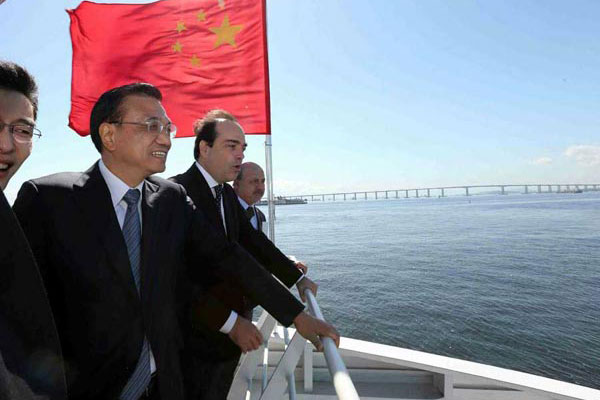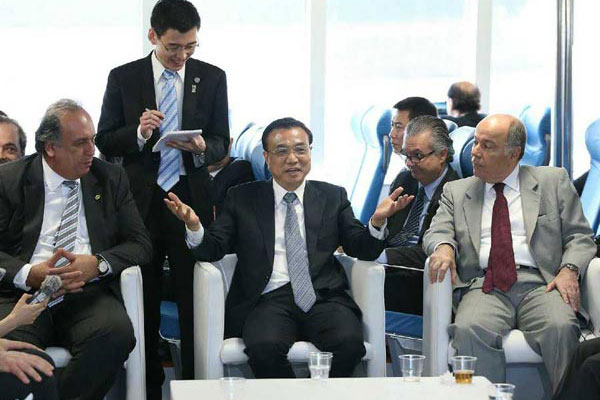
Premier Li Keqiang boards the Sugar Loaf Mountain ferry in Rio de Janeiro on May 20, 2015. The ferry was made in China and is named after one of Rio’s biggest tourist attractions and has a capacity of 2,000 passengers.[Photo/english.gov.cn]
China has pledged to open more manufacturing plants and maintenance centers in Brazil, which, along with the export of heavy equipment, is expected to boost Brazil’s economy on two fronts.
“China hopes not only to export advanced and environmentally friendly equipment to Brazil, but also to open plants and maintenance centers to create jobs,” Premier Li Keqiang said during a seminar on May 20 with Chinese and Brazilian corporate leaders in Rio de Janeiro.
“China is willing to cooperate with Brazil in industrial sectors such as automobiles, steel and construction materials,” Premier Li said. “We hope to export not only advanced technologies and equipment to Brazil, but also to set up factories and production streamlines to help create jobs.”
In return, China is willing to import beef and other competitive products from Brazil, Premier Li said.

Premier Li meets with over 20 Chinese and Brazilian entrepreneurs on a China-made ferry in Rio de Janeiro on May 20.[Photo/english.gov.cn]
China’s commitment is expected to help the Brazilian government create jobs and improve people’s lives, as Latin America’s largest economy copes with a fifth straight year of poor growth, difficulties in lending, and inflation.
To deepen bilateral economic cooperation, Premier Li said the two governments have to create more opportunities for business leaders to meet and settle deals. In addition, financial institutions from both sides should offer financing support as well.
“Brazil should streamline its visa applications for Chinese, especially for technical talents, to encourage people-to-people exchanges,” he said.
Paulo Cesar de Souza e Silva, executive vice-president of commercial aviation at Brazilian aerospace conglomerate Embraer, who was invited to the seminar, said his company is considering doing business with central and western cities in China.
“The market for regional planes in these areas is huge,” he said. “In addition, I believe that our strength in training pilots can fit into China’s demand for more pilots.”
The seminar took place on a China-made ferry, which carries commuters between Rio and Niteroi, where the main Rio Olympic venue was built.
“The state government of Rio has ordered seven ships like this from us, and this is the first one being delivered,” said Sun Dongsheng, general manager of Afai Southern Shipyard Ltd, the manufacturer of the ferry.
The ferries, together with the subway Line 4, will be the two major modes of transportation between Rio de Janeiro and the Olympic venues during the sporting event next year.
Carlos Roberto Osorio, Rio transportation secretary, said the upcoming Olympics will be an ideal showcase for Chinese equipment, because all of the visitors will have to travel via China-made equipment to watch the games.
